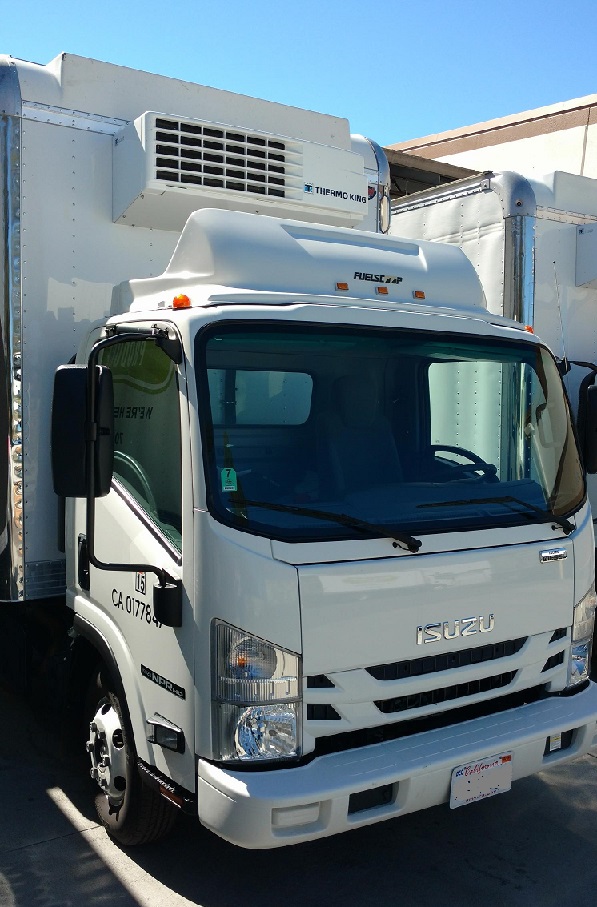Thermo King Transport Refrigeration: High Quality Air Conditioning for Cargo
Thermo King Transport Refrigeration: High Quality Air Conditioning for Cargo
Blog Article
Top Technologies in Transportation Refrigeration: Enhancing Efficiency and Safety
The landscape of transport refrigeration is undergoing considerable improvement, driven by advancements intended at improving both efficiency and safety and security. As these innovations proceed to develop, it is important to discover their effects on operational methods and regulative compliance, motivating a better evaluation of how they reshape the future of transport refrigeration.
Smart Temperature Level Monitoring Equipments
In the world of transportation refrigeration, smart temperature level monitoring systems have arised as an important technology for guaranteeing the honesty of temperature-sensitive goods. These innovative systems take advantage of Internet of Things (IoT) modern technology to offer real-time information on temperature level changes, making it possible for drivers to preserve optimal conditions throughout the supply chain. By continually tracking the temperature level of refrigerated containers and cars, companies can swiftly identify variances that might compromise item quality.

Additionally, smart tracking systems frequently include automated informs and alerts, enabling stakeholders to respond immediately to any prospective issues. This proactive method not just reduces the danger of spoilage but likewise boosts conformity with regulative criteria controling food safety and security and pharmaceutical transportation.
The combination of information analytics within these systems likewise helps with anticipating maintenance, assisting drivers to foresee possible equipment failures prior to they happen. This capability decreases downtime and enhances functional efficiency, eventually causing set you back financial savings.
Eco-Friendly Refrigerants
Smart temperature level monitoring systems play an important function in maintaining product top quality, but the performance of transportation refrigeration likewise pivots on the selection of cooling agents used. In contrast, arising alternatives like hydrocarbon-based refrigerants and hydrofluoroolefins (HFOs) existing lower GWP choices, using both effectiveness and sustainability.
These environment-friendly cooling agents not just lessen ecological influence but also straighten with global guidelines intended at eliminating dangerous materials. Their fostering can bring about boosted power performance, eventually decreasing operating prices for transportation refrigeration systems. Moreover, the usage of natural refrigerants, such as ammonia and co2, has obtained grip as a result of their exceptional thermodynamic residential or commercial properties and lower ecological impact.
Purchasing green refrigerants is not simply a regulative compliance step; it represents a strategic decision that boosts brand online reputation and fosters consumer commitment. thermo king truck refrigeration units. By focusing on lasting methods, firms can add to a greener future while ensuring the honesty of transferred products
Advanced Insulation Materials
Utilizing advanced insulation products is important for maximizing transport refrigeration systems, as they dramatically enhance power effectiveness and maintain regular temperature control. Typical insulation techniques often drop short in protecting against thermal transfer, causing enhanced power usage and rising and fall temperature levels within chilled compartments.
Emerging products such as vacuum shielded panels (VIPs) and aerogels use remarkable thermal resistance, permitting thinner profiles without compromising performance. VIPs, as an example, utilize a vacuum cleaner layer to reduce conductive and convective warmth transfer, making them suitable for space-constrained applications. Aerogels, known for their lightweight and porous structure, give exceptional insulation while considerably minimizing overall system weight.
Moreover, integrating phase navigate to these guys adjustment products (PCMs) into insulation systems can better support temperature levels throughout transit. These products soak up and release thermal power, successfully buffering against outside temperature variants.
The assimilation of these advanced insulation materials not just lowers the functional prices related to power usage however likewise extends the service life of temperature-sensitive goods. As the transport refrigeration market remains to develop, the fostering of cutting-edge insulation innovations will certainly be critical in boosting both effectiveness and safety in cooled transportation.
Automated Course Optimization
The effectiveness of transportation refrigeration systems is greatly boosted with automated route optimization, which leverages advanced algorithms and real-time data to establish the most efficient courses for shipment. By analyzing different aspects such as website traffic patterns, climate condition, and delivery home windows, these systems can substantially decrease traveling time and gas usage.
Automated path optimization reduces human error and subjective decision-making, which can bring about inadequacies. This modern technology allows fleet managers to assign sources better, ensuring that cooled items keep their needed temperature level throughout the trip. By maximizing paths, companies can additionally improve consumer fulfillment with timely deliveries.
Additionally, automated systems can adapt to unpredicted scenarios, such as road closures or sudden website traffic spikes, enabling vibrant rerouting. This adaptability not just shields the stability of temperature-sensitive products yet likewise adds to total operational effectiveness.
Implementing automated route optimization can result in substantial expense savings while decreasing the carbon footprint related to transportation. As organizations significantly focus on sustainability, this advancement stands apart as an important component in modern transport refrigeration, straightening functional goals with environmental responsibility. Inevitably, automated route optimization stands for a considerable advancement in the pursuit for efficiency and safety in transportation refrigeration.

Real-Time Information Analytics
Automated path optimization considerably advantages from the combination of real-time information analytics, which gives crucial insights into the efficiency of transport refrigeration systems. By utilizing real-time information, transport drivers can keep an eye on temperature level changes and tools efficiency, making sure that disposable products are kept within required criteria throughout address transit. This proactive technique not only enhances the high quality of the transported products however likewise alleviates the danger of wasting and loss.

Along with improving effectiveness, real-time analytics enhances safety and security by guaranteeing compliance with governing requirements for temperature control. This not only safeguards public health and wellness however also fortifies a business's online reputation - refrigerated transportation thermo king. As the transport refrigeration industry advances, the assimilation of real-time information analytics arises as a foundation for driving development, sustainability, and operational excellence
Verdict
In final thought, the improvements in transport refrigeration considerably enhance both efficiency you could try these out and security within the industry. Jointly, these innovations stand for an essential advancement in transport refrigeration, ensuring conformity with governing requirements and promoting a greener future.
The landscape of transportation refrigeration is undertaking substantial improvement, driven by advancements intended at enhancing both performance and safety.Smart temperature level monitoring systems play a crucial function in maintaining item quality, but the effectiveness of transportation refrigeration also hinges on the selection of cooling agents utilized. Their adoption can lead to improved power efficiency, eventually decreasing operating prices for transport refrigeration systems. Ultimately, automated route optimization represents a significant advancement in the quest for effectiveness and security in transportation refrigeration.
In final thought, the improvements in transport refrigeration significantly improve both efficiency and security within the market.
Report this page